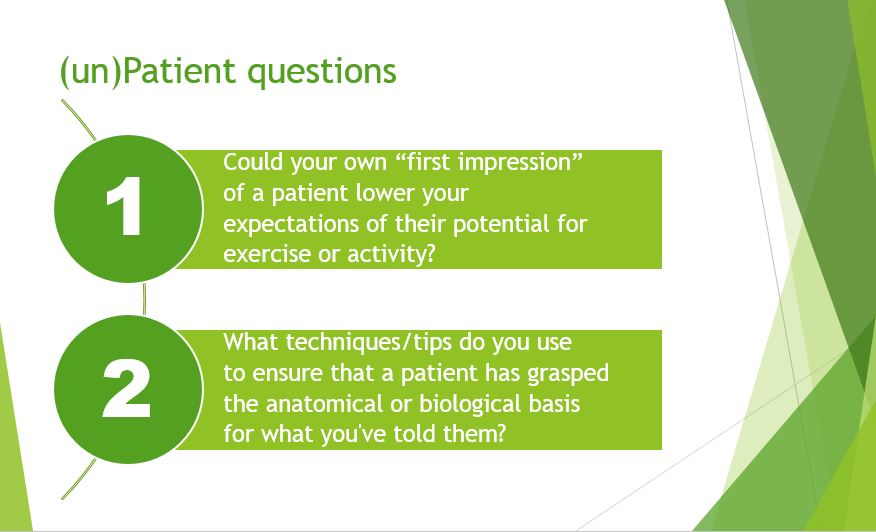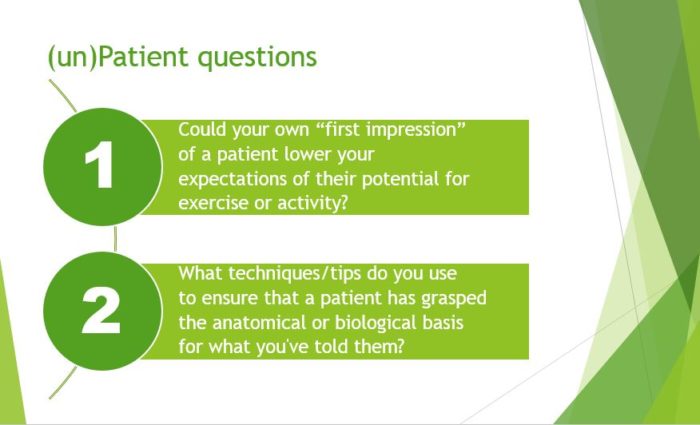This afternoon I heard from the organizers of the 2019 “Pain UnConference”(1), about my participation as an “UnPatient”. This one-day event, for physical and occupational therapists, was being organized by the Pain Science Division of the Canadian Physiotherapy Association.(2) What exactly is an UnConference? Great question!
UnConferences are events run by participants.
Attendees can submit topics or challenges, set the agenda for what’s discussed, and create an environment of productive discussion.
Instead of passive listening, all attendees and organizers are encouraged to become participants, with discussion leaders providing moderation and structure for attendees.”(1)
The 2019 Pain UnConference was planned for next Saturday, at McGill University, and I’d been looking forward to providing a patient perspective during the event. Unfortunately, the 2019 Pain UnConference won’t be taking place after all; I suppose there’s just too much going on in September, on a Saturday, to attract enough attendees.
It likely didn’t help that the late-summer weather here in Montreal has been phenomenal this year. It’s understandably difficult to get local folks to commit to spending a weekend day indoors, when we know that we’ll soon be dealing with winter snow and ice… That said, I’m disappointed all the same.
The theme for the day was: “Managing persistent pain through communication, coaching, and therapeutic alliance”.(1) To give you a taste of just how interesting this event would have been, here are some highlights of the planned program…
“Coffee with Keynotes and Sandra Woods”; Sandra “shares her story as an ‘unpatient’ living with Complex Regional Pain Syndrome”(1). I’d have opened the day with a very brief talk, a funny UnPatient story, and two open-ended questions to the healthcare professionals participating in the UnConference.
Then there would have been time for informal discussions, over coffee, so that each participant would have the opportunity to speak directly with the keynote speakers. That’s already quite a difference from the regular conference format!
Next up would have been the first keynote speaker (a Habs fan from Western Canada!), Dr. Maxi Miciak on “Building and harnessing the power of effective therapeutic alliance”(1) After lunch, the first active learning session of the day would have been putting this into practice. Another marked difference from a traditional conference environment!
I’d have been there for the full day, providing (un)patient comments and feedback during the active learning sessions. Most of my CRPS awareness activities are aimed at healthcare professionals, so I’m very comfortable in this type of environment. You can read a bit more about that, in my post about planning for the 2019 Pain Unconference.
The second keynote, by Dr. Jason Silvernail from the US military, was to have been “Understanding the impact of health behaviours on pain and function, and improving them through communication and coaching”.(1) Dr. Silvernail would then have led a practice session, so that participants could hone their patient coaching skills.
Rather than concluding the day with another presentation, it would have ended with questions from the attendees – with whatever topics they wanted to discuss in more depth.
Since I won’t have the chance to share my (un)patient questions, for physiotherapists, occupational therapists, and other rehabilitation professionals, here they are:

It would have been a really interesting, and useful, event for healthcare professionals who work with patients in chronic – or persistent – pain. The point, of course, is that it would have benefited their patients as well. And that’s why I’m so disappointed that this event won’t take place this year; so hopefully it will happen at some point in the future!
References:
(1) Canadian Physiotherapy Association, Pain Science Division. 3rd Pain Unconference. Online. Accessed 16 Sep 2019: https://www.painunconference.com
(2) Canadian Physiotherapy Association, Pain Science Division. Online. Accessed 16 Sep 2019:
https://physiotherapy.ca/divisions/pain-science

